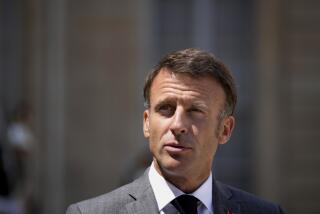Croatia Leader Insists He’ll Expel U.N. Force
- Share via
ZAGREB, Croatia — Despite diplomatic pressure, Croatian President Franjo Tudjman is refusing to back away from his decision to expel U.N. peacekeepers from his country next month.
The move is part of a high-risk strategy to regain Croatian territory lost to Serbian forces more than three years ago.
The latest evidence of Tudjman’s determination came Tuesday, when he and other senior Croatian leaders reportedly stressed during talks with European Union External Affairs Commissioner Hans van den Broek that they have no intention of retreating from an announcement last month to terminate on March 31 the mission of the 12,000 U.N. soldiers based in the country.
“It was quite clear that his decision was irreversible,” Van den Broek said after the meeting.
The former Dutch foreign minister’s Tuesday visit, an effort to soften the Croatian stance, followed earlier harsh warnings by Secretary of State Warren Christopher and German Foreign Minister Klaus Kinkel.
Last week, Christopher told the Senate Foreign Relations Committee: “I think President Tudjman is making a serious mistake, a fundamental miscalculation, in asking for the withdrawal.”
Tudjman’s plan to end U.N. monitoring of a 1,000-mile-long, mile-wide cease-fire line that has generally kept Serbs and Croats from each other’s throats for most of the last year marks the latest twist in the Balkan crisis.
While Tudjman and those around him seem sure that ending the U.N. role in Croatia is a first step toward regaining the occupied land, others fear that the move will merely create another flash point in a region that already hovers on the edge of chaos.
“We see a real danger of an immediate return to war,” said Paul Risley, deputy spokesman for the U.N. Protection Force. “Even if both sides say they won’t fight, there’s going to be a rush to seize places (within the mile-wide separation zone) that offer advantage, and that will trigger new conflict.”
A senior Zagreb-based Western diplomat said that under a worst-case scenario, the U.N. pullout would trigger Serb-Croat skirmishes along the cease-fire line that could erupt into a full-scale war between Serbia and Croatia.
On the other hand, this diplomat said, there is an outside chance that Tudjman’s gamble could exert the necessary pressure to bring about a swift diplomatic solution--which might restore Serb-held areas to Croatian control, but with a large degree of local autonomy.
“The end result will likely be something in between these extremes,” he said. “But I’m not optimistic.”
At stake is just under 30% of Croatian territory now controlled by the autonomous, self-proclaimed Republic of Serbian Krajina, established more than three years ago with the help of the Yugoslav National Army, loyal to Serbia and its leader, Slobodan Milosevic.
*
Since then, this area has remained under Serbian control, legally unrecognized but receiving the support of its Serbian majority population, some military and other supplies from Serbia and the protection of U.N. peacekeepers.
Under the original terms of the 1992 U.N. deployment, peacekeepers were to protect Serbian villages after a withdrawal of the Yugoslav army and then supervise the region’s return to Croatian control. But the peace plan was never implemented.
“If we let the U.N. stay forever, we’ll be no different than Cyprus, and that is unacceptable,” said Tudjman’s spokesman, Jozip Curec.
More to Read
Sign up for Essential California
The most important California stories and recommendations in your inbox every morning.
You may occasionally receive promotional content from the Los Angeles Times.












